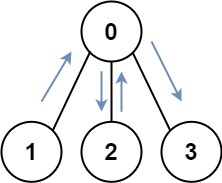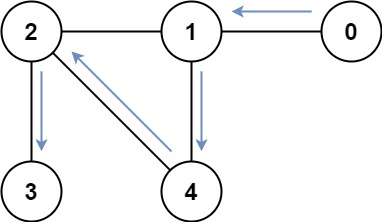LeetCode in Kotlin
847. Shortest Path Visiting All Nodes
Hard
You have an undirected, connected graph of n nodes labeled from 0 to n - 1. You are given an array graph where graph[i] is a list of all the nodes connected with node i by an edge.
Return the length of the shortest path that visits every node. You may start and stop at any node, you may revisit nodes multiple times, and you may reuse edges.
Example 1:

Input: graph = [[1,2,3],[0],[0],[0]]
Output: 4
Explanation: One possible path is [1,0,2,0,3]
Example 2:

Input: graph = [[1],[0,2,4],[1,3,4],[2],[1,2]]
Output: 4
Explanation: One possible path is [0,1,4,2,3]
Constraints:
n == graph.length1 <= n <= 120 <= graph[i].length < ngraph[i]does not containi.- If
graph[a]containsb, thengraph[b]containsa. - The input graph is always connected.
Solution
import java.util.LinkedList
import java.util.Objects
import java.util.Queue
class Solution {
fun shortestPathLength(graph: Array<IntArray>): Int {
val target = (1 shl graph.size) - 1
val q: Queue<IntArray> = LinkedList()
for (i in graph.indices) {
q.offer(intArrayOf(i, 1 shl i))
}
var steps = 0
val visited = Array(graph.size) {
BooleanArray(
target + 1,
)
}
while (q.isNotEmpty()) {
val size = q.size
for (i in 0 until size) {
val curr = q.poll()
val currNode = Objects.requireNonNull(curr)[0]
val currState = curr[1]
if (currState == target) {
return steps
}
for (n in graph[currNode]) {
val newState = currState or (1 shl n)
if (visited[n][newState]) {
continue
}
visited[n][newState] = true
q.offer(intArrayOf(n, newState))
}
}
++steps
}
return -1
}
}

